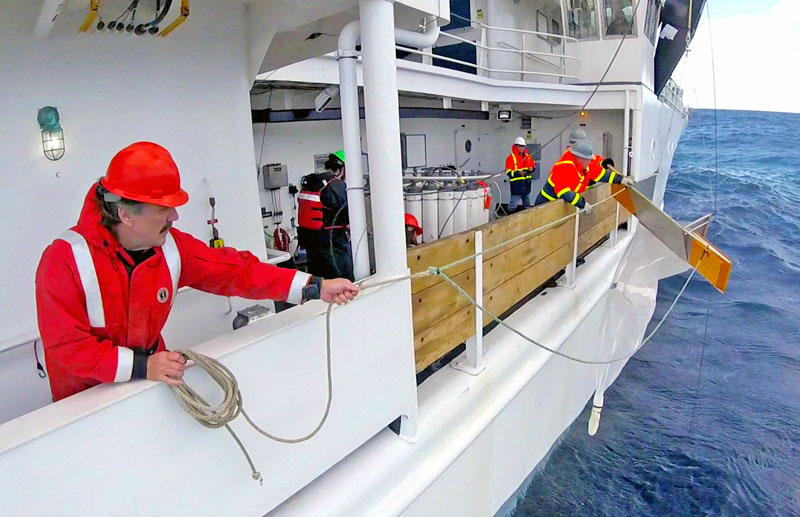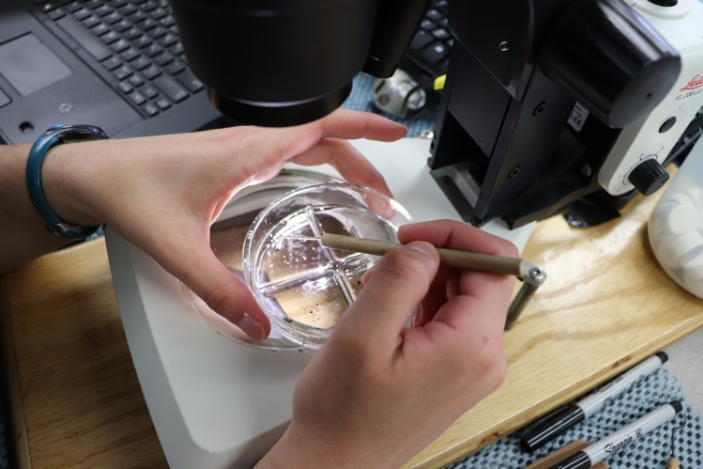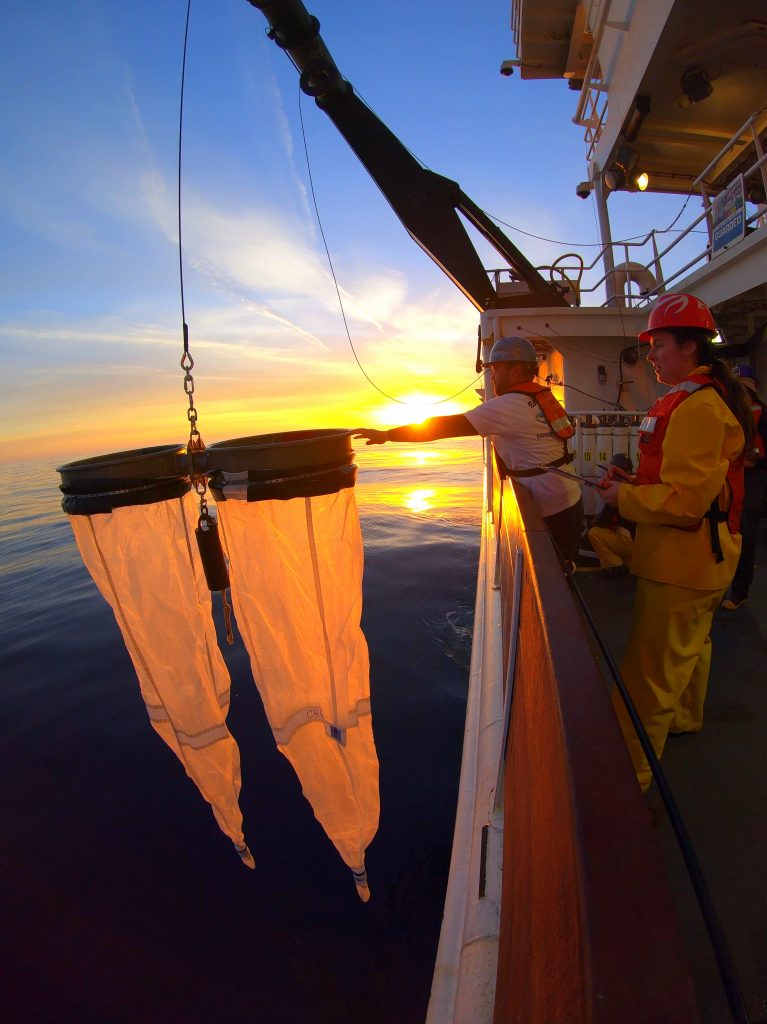Volunteering
Interested in participating in a research cruise? CalCOFI typically recruits 1-4 volunteers per cruise to help deploy oceanographic equipment, collect seawater samples, preserve zooplankton & ichthyoplankton samples, and filter samples to analyze phytoplankton community structure.
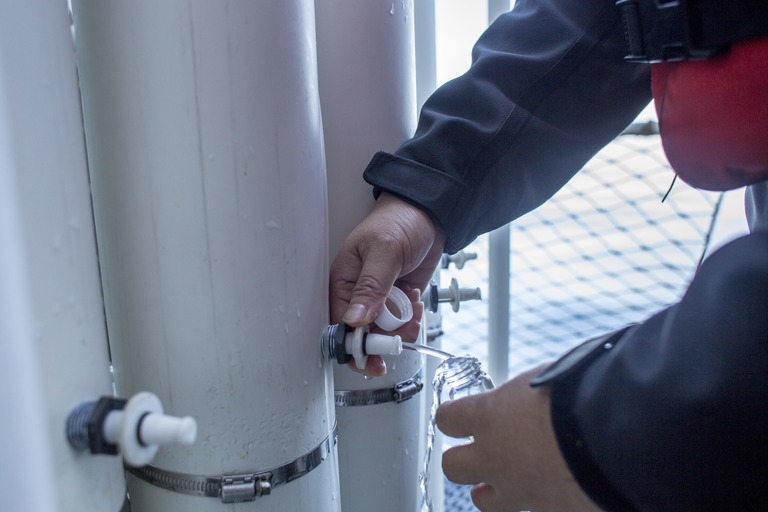
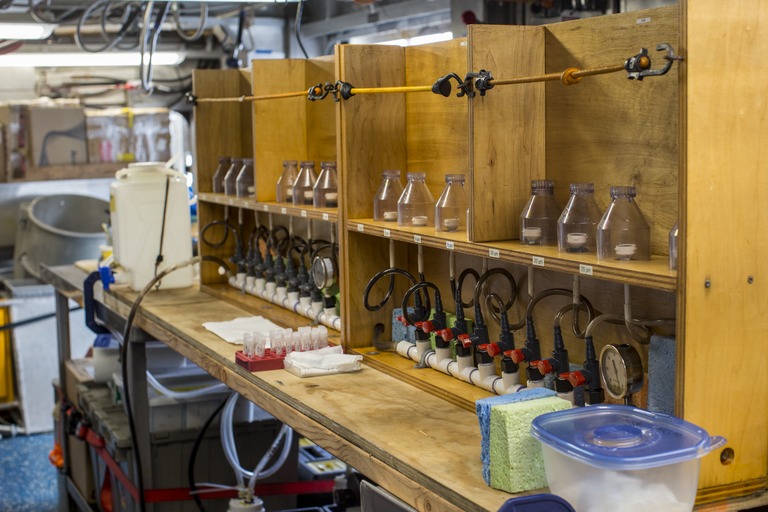
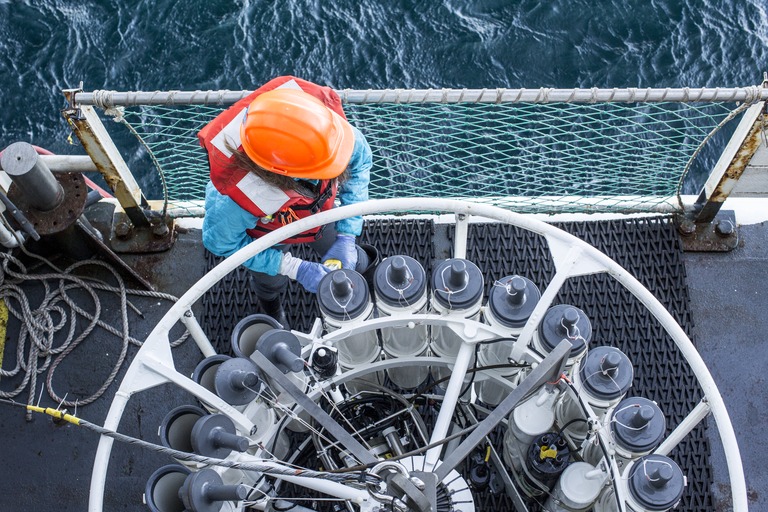
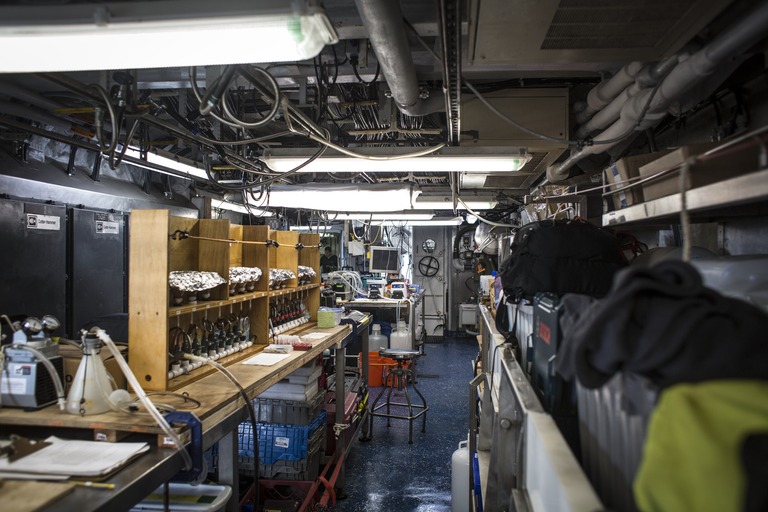
General Criteria for Applicants:
- Sea-worthiness (experience at sea, recreational is acceptable)
- Good health; able to lift 50 lbs
- Scientific background (ideally has completed at least two years in college)
- Ability to follow detailed instructions carefully
- Ability to work safely on an oceanographic cruise
- Availability – cruises are 10 – 30 days
- Able & willing to work a 12 hr watch (noon to midnight or midnight to noon) for 16+ days
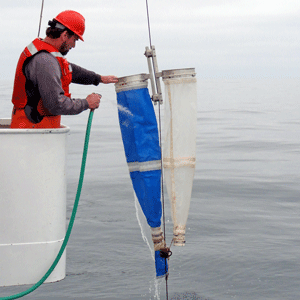
Check our Cruise Schedule for upcoming cruise dates
Please note that dates are subject to change.
Additional information is available in the CalCOFI Handbook. If you are interested in participating, please send your resume and a detailed description of your seagoing experience and interests to aleffinger@ucsd.edu & calcofi-team@ucsd.edu.
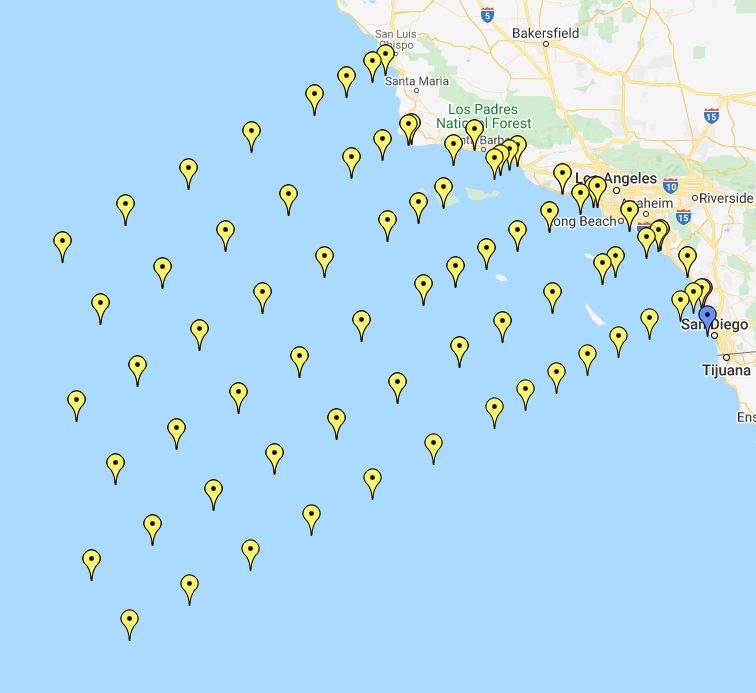
- What to Bring
- Frequently Asked Questions
Most necessities are provided by the ship but we recommend bringing the following things to make the cruise more comfortable:
Sea sickness medication:
If you know you are prone to seasickness, bring medication that you know works for you. Marezine, Meclizine, Bonine, Dramamine or Scopolamine anti-seasick medications are some examples – some work for some people, some have side effects, and some dosages require a prescription. The ship can provide over-the-counter remedies but we suggest consulting your doctor or pharmacist & bringing your own. Summer and fall cruises are typically calm but the weather can get rough any time of year. Ginger chews are a good natural option, however, they may not be enough in rough conditions.
Clothes you can layer:
It is better to wear multiple layers than wear a heavy jacket since you will be moving in and out of the climate-controlled lab. Even summer cruises can be very cold, so always bring long pants, a windbreaker, sweater or sweatshirt, and a beanie.
Clothes for a week or more:
Laundry facilities are available but the washing machine will be unavailable during rough weather so plan accordingly for 16 days.
Backpack:
Its a good idea to bring a backpack/tote bag so that each day when you start your shift you can bring the things you’ll want for the day to the lab. There is a general rule that we do not go into our rooms during our shifts – during those 12 hours your bunkmate gets the room to themselves, and hopefully they treat you with the same courtesy. We try to match you with a bunkmate on the opposite shift, although sometimes there will be some overlap because certain shifts are not on the typical 12am/pm cycle.
Soft luggage:
We recommend using soft luggage to stow your clothes and other personal gear such as a duffle bag or backpack since hard suitcases will not stow easily into your stateroom closet/locker.
Rain gear:
Foul-weather jacket and pants are worth taking along. We can provide a few pairs but sizes vary so if you have something waterproof, bring it.
Close-toed footwear:
These are mandatory while working on-deck and any general work areas. Steel-toed shoes/boots can provide extra protection but are not necessary.
Boots:
Calf-high rubber boots are highly recommended. The work area is usually swamped by seawater so your shoes will constantly be wet. Comfortable, waterproof boots are a necessity since you will be sampling from the CTD or washing nets. The more comfortable the better, but even cheap ones are better than wet sneakers. We have a limited supply of ‘loaner’ boots available upon request.
Sun protection:
Sunglasses, a hat, sunscreen and chapstick – you can minimize your sun exposure but these are worth bringing.
Toiletries and medications:
The ship provides linens and bath towels, but bring your own personal hygiene products (shampoo, soap, decongestant, Advil, etc). The ship is relatively small, so please bathe regularly as a courtesy to other people.
Workout clothes/gear:
The gear available varies by ship but all have some cardio machines and bench/free weights available.
Books/magazines/music:
The ship has a paperback library plus movies, but the selection varies, so bringing some books/entertainment is an excellent idea. There can be a lot of downtime, especially offshore where we have 4-hour transits between stations. There is WIFI, but streaming is not allowed. So download your music/podcasts/audiobooks before the cruise. Make sure the apps you want are all downloaded (sometimes iPhones offload them) because the ship’s internet usually cannot handle downloading those either.
Binoculars/camera:
Sightings of birds and marine mammals such as seals, whales, or porpoises are common on CalCOFI cruises.
Snacks and coffee:
Some ships provide lots of these but if you are particular, bring it. Midnight watch-standers often bring extra snacks since meals are not served from 6pm to 7:30am. However, there are always sandwich fixings, cereals, leftovers, and you can request a plate be saved for you from dinner. If you have any dietary restrictions (allergies, gluten, vegetarian or vegan) please let the volunteer coordinator know and fill out ship paperwork accordingly. There is always fresh coffee in the mess though.
Hard hat:
NOAA & SIO vessels require hardhats during loading and while working on deck. The ship will provide one but bring one if you prefer your own.
Q: What is CalCOFI?
A: California Cooperative Oceanic Fisheries Investigations (CalCOFI) is a unique 75+ year partnership of Scripps Institution of Oceanography, NOAA Fisheries Service, and the California Department of Fish and Game. The organization was formed in 1949 to study the ecological aspects of the collapse of the sardine populations off California. Today its focus has shifted to the study of the physical and biological oceanography off the coast of California and the management of its living resources.
Q: What hours will I be working?
A: We all stand a daily 12-hour watch; you will not necessarily be working the whole 12 hours each day, but you will need to be ready and available to work as soon as we approach each station (typically 2 or 4 hours apart) during your watch. Everyone is assigned a watch (noon to midnight, or midnight to noon) and must keep the same watch for the duration of the cruise.
Q: Do I need to complete any training prior to the cruise?
A: All training will be provided onboard and our volunteers usually have the routine down after the first 2-3 days.
Q: How far offshore do we go and where are the sampling stations located?
A: At most, we will be around 400 miles offshore, which is about five science days from land (only about 1-2 days if not stopping for stations). You can see our station pattern/sampling locations here.
Q: Is there WIFI and/or cell signal?
A: There is WIFI onboard but it is limited (streaming is not permitted). We encourage you to download your music, podcasts, audiobooks, and apps before the cruise because the ship’s internet usually does not allow you to complete these downloads (be aware that iPhones often offload unused apps, so make sure you have the ones you want). There is cell signal when we are close to shore, however, some of our longer transects have us offshore for about a week. Depending on timing, we may be close to shore while you are sleeping, so do not plan on making regular phone calls. There is a satellite phone on the bridge that is available for emergency phone calls.
Q: How many people will be on board the ship?
A: There are usually 30-40 people aboard the ship. That includes ~14-18 scientists (from NOAA, SIO, LTER, and 2-4 volunteers) and ~15-20 crew (engineers, captain/mates, deck hands, and cooks).
Q: What sort of work will the volunteers be doing?
A: There are two volunteer roles:
1. Oceanographic volunteer (for SIO): assisting with the preparation of the CTD-rosette, collecting seawater samples (to be analyzed for salinity, nutrients, chlorophyll, etc.), filtering seawater, chlorophyll analysis, filling out data sheets.
2. Fisheries volunteer (for NOAA): deploying and recovering plankton nets, preserving the collected plankton samples, labeling and archiving samples, recording weather data.
Q: What do people typically do while they are off duty?
A: When you are not on shift, you can relax in the lounge (there is a TV and plenty of movies and books), hang out on deck (as long as you are out of the way of science operations), work out in the gym (it has a treadmill, a stationary bike, and some free weights), etc. We recommend also bringing some of your own books/entertainment/crafts/etc; there can be a lot of downtime, especially offshore where we have 4-hour transits between stations. You are welcome to watch tv/read/relax during these times, as long as you are ready when we get on station (this includes helping to prep the CTD ~20 mins before station arrival).
Q: Are meals/snacks provided?
A: The cooks make us three meals a day with set meal times that differ among ships but are usually around 7AM, 12PM, and 5PM. If you are on the midnight to noon shift, you can request that the cooks save you a plate from dinner. There are also plenty of snacks left out, cereal, coffee, and things to make sandwiches.
If you have any allergies or dietary restrictions be sure to mention those when filling out your cruise paperwork. If you enjoy certain snacks feel free to bring some with you.
Q: Is there laundry onboard?
A: Yes, it depends on the ship but there are usually at least two washers and dryers onboard, and plenty of laundry soap/dryer sheets. We ask that you to try and wait until you have a full load to do laundry so pack enough clothes for about a week.
In addition to CalCOFI cruises, NOAA Fisheries trawl cruises happen every Spring and/or Summer and they also need volunteers. Contact Brittany Schwartzkopf if you are interested in volunteering on a fisheries trawl survey.
